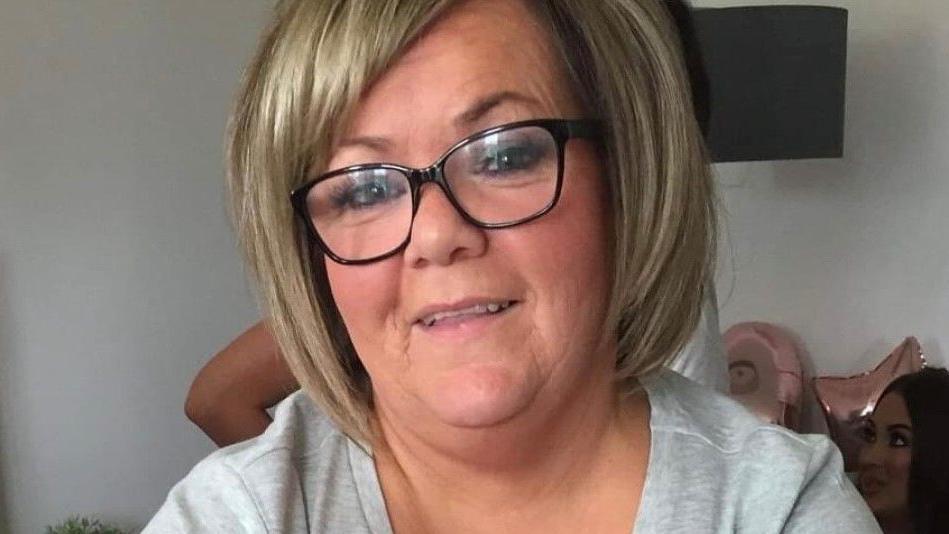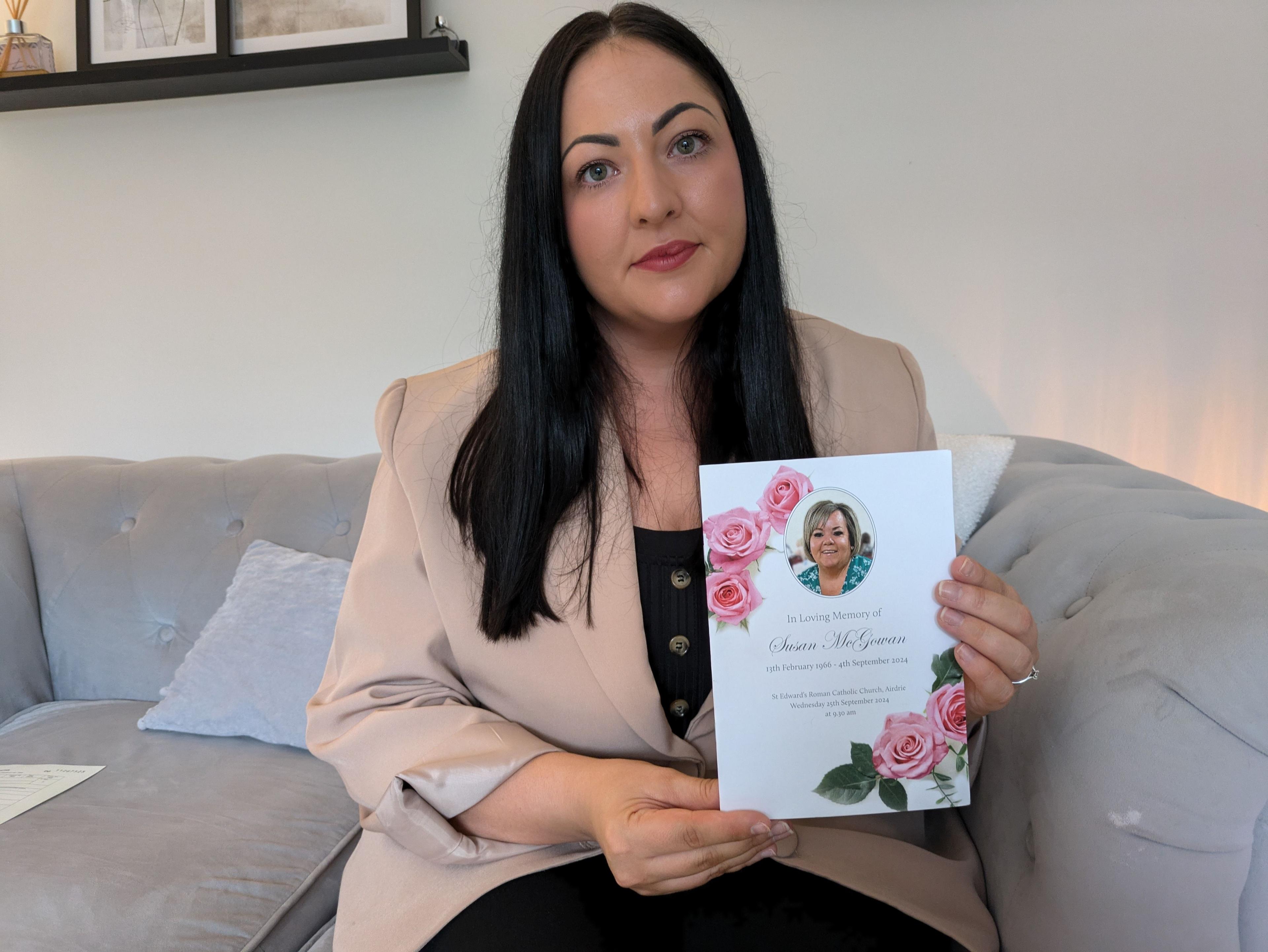Nurse’s death linked to approved weight-loss drug

Susan McGowan died two weeks after taking tirzepatide - brand name Mounjaro
- Published
The death of a nurse from North Lanarkshire has been linked to the use of a weight-loss drug recently approved for use on the NHS.
Susan McGowan, 58, took two low-dose injections of tirzepatide, known under the brand name Mounjaro, over the course of about two weeks before her death on 4 September.
Her death certificate, seen by the BBC, lists multiple organ failure, septic shock and pancreatitis as the immediate cause of death – but "the use of prescribed tirzepatide" is also recorded as a contributing factor.
It is thought to be the first death officially linked to the drug in the UK

Ms McGowan worked at Monklands hospital for 30 years
Ms McGowan worked as a nurse at University Hospital Monklands in Airdrie for more than 30 years.
The popular bed manager had often discussed her weight loss attempts with close friends, but the emergence of new weight-loss jabs seemed to her to offer better chances of success.
After researching Mounjaro and seeking medical advice, she purchased a prescription via a registered online pharmacy.
The drug typically costs between £150 and £200 for a four-week supply and can be purchased from any registered pharmacy in the UK.
Days after her second injection she began experiencing severe stomach pains and sickness, so she went to A&E at Monklands - where her colleagues battled to save her life.
Jade Campbell, Ms McGowan's niece, was with her when she died.

Jade Campbell said her aunt was kind, generous and bubbly
She said: “Susan had always carried a wee bit of extra weight but there were never any health concerns. She wasn't on any other medication. She was healthy."
“Susan was such a bubbly person. She was really generous, she was really kind and she was the life of the party - a huge personality. They said she had the biggest laugh in the hospital."
Ms Campbell was told by doctors that her aunt's kidneys were not functioning properly. Days later she went into a coma, and her organs began to fail.
"It was so quick," she said. "I still find myself thinking, ‘has that actually happened?’"
Tirzepatide is one of a group of weight-loss drugs known as GLP-1 receptor agonists, which work by making the patient feel fuller for longer.
It was approved for use as a weight-loss aid in the UK in 2023 by the Medicines and Healthcare products Regulatory Agency (MHRA).
That included use on the NHS, although the drug is currently only prescribed by the NHS for a small number of patients due to factors like cost and availability.
The MHRA runs the yellow card scheme, where any member of the public or health profession can log reports of suspected side effects of drugs.
Public data is only available up to May this year, but between January and May 2024 there were 208 reports about tirzepatide on the yellow card scheme, including 31 serious reactions and one suspected death of a man in his sixties.
Ms McGowan's death is too recent to appear within this data.

Ms McGowan with her niece Jade Campbell at her wedding
Dr Alison Cave, MHRA chief safety officer, said that new medicines, such as tirzepatide, are more intensively monitored to ensure any new safety issues are identified promptly.
She said: "Our sincere sympathies are with the family of individual concerned. Patient safety is our top priority and no medicine would be approved unless it met our expected standards of safety, quality and effectiveness.
"We have robust, safety monitoring and surveillance systems in place for all healthcare products.
"On the basis of the current evidence the benefits of GLP-1 RAs outweigh the potential risks when used for the licensed indications."
Mounjaro manufacturer Lilly said patient safety was the company's top priority.
A spokesperson said: "We are committed to continually monitoring, evaluating, and reporting safety information for all Lilly medicines.
"Mounjaro was approved based on extensive assessment of the benefits and risks of the medicine, and we provide information about the benefits and risks of all our medicines to regulators around the world to ensure the latest information is available for prescribers."
Are weight-loss drugs safe?
Semaglutide, known by the brand names Wegovy and Ozempic, are also GLP-1 receptor agonists.
There have been 23 suspected deaths linked to semaglutide in the UK via the yellow card scheme since 2019.
These drugs have passed the clinical trials needed to be approved for use in the UK and have been cautiously welcomed by those working to tackle obesity.
Naveed Sattar, professor of metabolic medicine at the University of Glasgow and chairs of the UK government’s obesity mission, said it was difficult to establish "cause and effect" in single cases where patients die after taking the drugs.

Prof Naveed Sattar says many people could benefit from approved weight-loss drugs
He said: “Trials are very robust in trying to establish safety, that the drugs generally have substantial benefits that outweigh the risks.
“There’s enough evidence available that these drugs have strong meaningful weight loss, that the side effect profiles are generally ok for the vast majority of individuals.
“The reality is we have a big need to help many people living with extreme levels of high BMI to help lose weight with these drugs that will give multiple benefits and for many years we haven’t had such tools. There are many individuals, roughly speaking one in four to one in five adults living in the UK, who could benefit from these drugs.”
Tirzepatide became the subject of national debate recently when the UK government announced plans to roll it out to unemployed people to help them back into work.
The government is partnering with Mounjaro manufacturer Lilly to run a five-year study which will involve up to 3,000 people.
Separately, there are proposals by NHS England for an evaluation of the drug which will involve nearly 250,000 people. Health Secretary Wes Streeting has hailed the jabs as "game-changing".
But Ms Campbell believes it is not the right time and hopes the UK government will reconsider the decision.
She said: “I think anything that's backed by the government, you would trust. I would ask you to speak to your GP about things like this first, there might be another option for you to consider before you jump on the weight-loss injections."
BBC News asked the department of health and social care if it would review its decision given Ms McGowan’s death.
The UK government declined to comment.
Additional reporting by James Cheyne.
Weight loss injections: How do drugs like Wegovy and Mounjaro work?
- Published29 August
Unemployed could get weight loss jabs to return to work
- Published15 October 2024
Weight-loss surgeon told patient 'eat, eat, eat'
- Published15 January 2024
Get in touch
Do you have information related to this story?